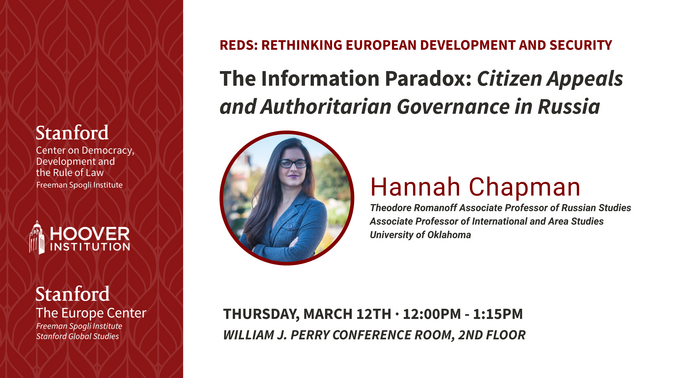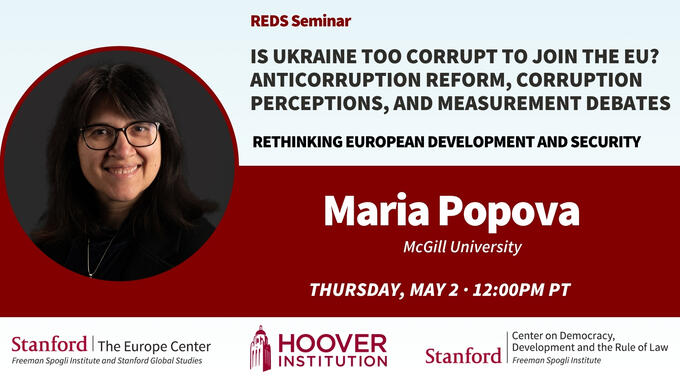Hannah Chapman | REDS Seminar - The Information Paradox: Citizen Appeals and Authoritarian Governance in Russia

Russia's shift from informational autocracy toward overt repression has made understanding public sentiment more urgent yet increasingly difficult. One channel remains: appeals systems, through which hundreds of thousands of citizens each year bring grievances directly to the state. What concerns do citizens raise, and how does the regime respond? Drawing on original data from Russia's presidential appeals system, this talk examines what appeals reveal about everyday citizen-state relations, governance challenges, and how autocratic institutions that promise responsiveness actually function under pressure. Appeals offer a unique behavioral measure of citizen concerns, capturing the experiences of those most affected by governance failures—offering insight into a regime that has become increasingly opaque.
Hannah S. Chapman is the Theodore Romanoff Assistant Professor of Russian Studies and an Assistant Professor of International and Area Studies. Previously, she was a George F. Kennan Fellow at the Kennan Institute of the Woodrow Wilson International Center for Scholars.
Her research, teaching, and service are in the fields of comparative political behavior with a substantive focus on public opinion, political participation, and political communication in non-democracies and a regional focus on Russian and post-Soviet politics. She teaches undergraduate and graduate courses in authoritarianism, Russian domestic and international politics, and comparative politics.
Her book project, Dialogue with the Dictator: Information Manipulation and Authoritarian Legitimation in Putin's Russia, examines the role of quasi-democratic participation mechanisms in reinforcing authoritarian regimes. Her work has been published in Comparative Political Studies, Comparative Politics, Democratization, International Studies Quarterly, and the Washington Post.
REDS: RETHINKING EUROPEAN DEVELOPMENT AND SECURITY
The REDS Seminar Series aims to deepen the research agenda on the new challenges facing Europe, especially on its eastern flank, and to build intellectual and institutional bridges across Stanford University, fostering interdisciplinary approaches to current global challenges.
REDS is organized by The Europe Center and the Center on Democracy, Development and the Rule of Law, and co-sponsored by the Hoover Institution and the Center for Russian, East European and Eurasian Studies.
Learn more about REDS and view past seminars here.

Virtual to Public. If prompted for a password, use: 123456
Only those with an active Stanford ID with access to William J. Perry Conference Room in Encina Hall may attend in person.

 FSI researchers work to understand continuity and change in societies as they confront their problems and opportunities. This includes the implications of
FSI researchers work to understand continuity and change in societies as they confront their problems and opportunities. This includes the implications of 







